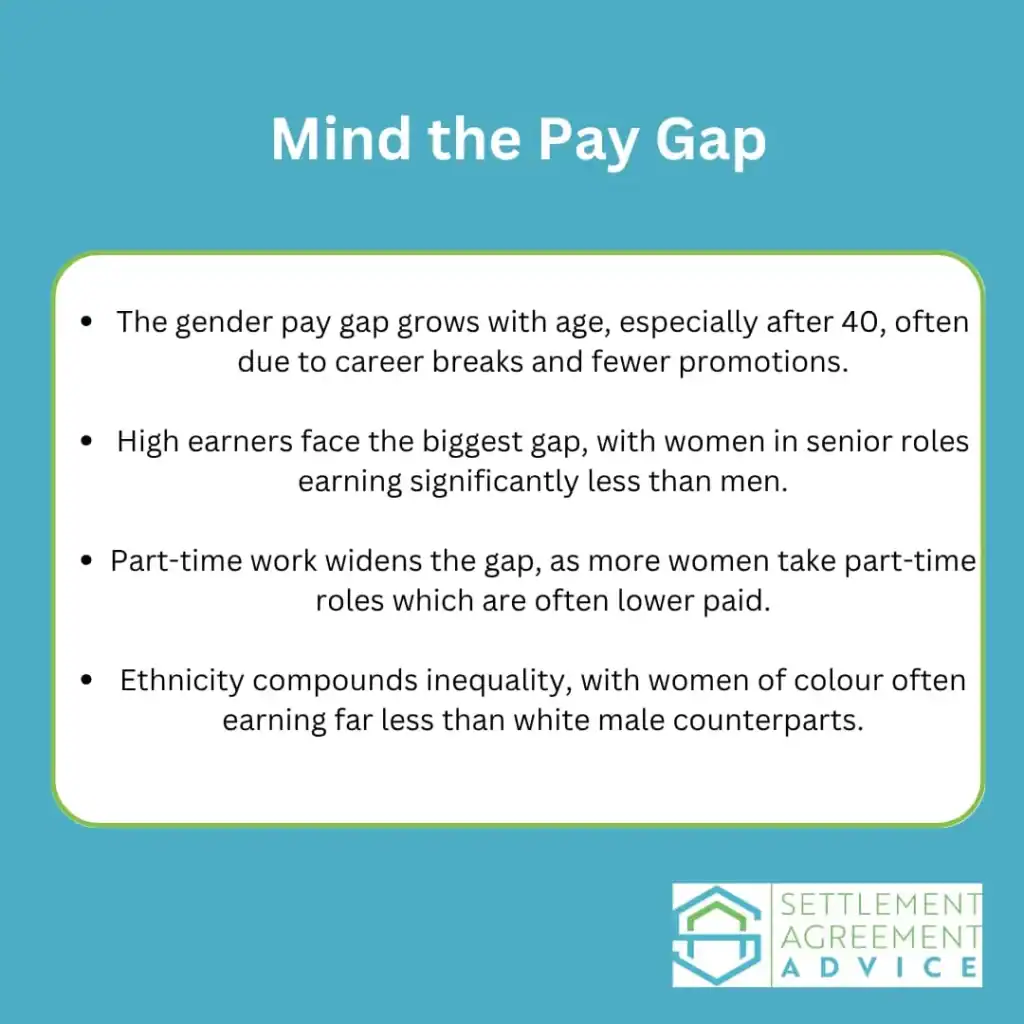The gender pay gap remains a pressing issue in UK workplaces. Many employees, particularly women, are being paid less than their male counterparts for the same or similar work. If you’ve discovered an unfair difference in your pay, you may be wondering whether to settle or take legal action. We break down your choices and help you weigh up which route could work best in your situation.
What is the Gender Pay Gap?
The gender pay gap is the difference between the average earnings of men and women across the workforce. It is not the same as equal pay (which is paying men and women differently for the same work – something that is illegal). The gender pay gap can exist due to a range of factors. This can include career breaks, part-time work and the underrepresentation of women in senior roles.
These patterns often limit earning potential and progression, even when women have equal skills and experience. Addressing these issues is essential for achieving true pay equality.
Gender Pay Gap Statistics
Gender pay gap statistics don’t lie. According to the Office for National Statistics, in April 2024, the UK gender pay gap for full-time workers was 7.0%, down from 7.5% in 2023. Older workers and high earners saw the biggest gaps. Pay differences were still wider in England compared to Wales, Scotland and Northern Ireland.
Signs of Gender Pay Discrimination
Not all pay gaps are unlawful, but some situations may qualify as gender pay discrimination:
- You and a male colleague do the same job, but he is paid more.
- You’ve been denied a bonus or raise that your male peers received.
- You’re overlooked for promotion, despite having equal or better qualifications.
- Your employer can’t justify why a pay difference exists.
These situations may give you grounds for a legal claim.
What Are Your Legal Rights?
Under the Equality Act 2010, employees have the right to equal pay for equal work. If you believe you’re being underpaid due to your gender, you can:
- Request a pay comparison with a male colleague.
- Raise a grievance with your employer.
- Claim to an Employment Tribunal.
However, strict time limits apply. Claims must usually be brought within six months of leaving the job.
Should You Settle or Fight for Compensation?
When facing a gender pay dispute, you typically have two routes:
1. Settlement Agreement
A settlement agreement is a legally binding document where you agree not to pursue a claim in exchange for compensation. It’s quicker, more private and less stressful than a tribunal.
2. Employment Tribunal
If your employer refuses to negotiate or you believe your case is strong, you can take them to a tribunal. This can result in higher compensation and public accountability, but it can also be lengthy, stressful and unpredictable.
Negotiating a Settlement Agreement
Many employees ask: “What if I want to settle, but the offer feels unfair?” That’s where negotiation comes in.
You don’t have to accept the first offer. It’s often a starting point. With support from settlement agreement solicitors, you can negotiate:
- A fair compensation amount
- Backdated pay for underpayment
- A positive job reference
- A confidentiality clause that works both ways
You might feel pressured to sign quickly, but it’s okay to pause and ask questions.
Many people don’t know that these agreements can be negotiated, and you’re not alone if you’re unsure.
The Roots of Gender Pay Unfairness
The roots of gender pay unfairness run deep. Until 1970, it was legal in the UK to pay women less than men for doing the same job. Changes have occurred, but even decades later, inequality persists.
Despite the 2010 Equality Act and gender pay gap reporting introduced in 2017, women in full-time jobs still earn around 7% less than men on average. Historical job segregation and outdated gender norms continue to shape the pay landscape today.

How Ethnicity Deepens the Pay Gap
Women of colour face an even wider pay gap, often earning significantly less than white men doing similar work. This overlap of race and gender discrimination compounds inequality and makes fair compensation even harder to achieve.
Real-Life Gender Pay Scenario
Earlier this year, thousands of mostly female Asda shop workers won the latest stage of a decade-long equal pay case. A tribunal ruled their roles were equal in value to higher-paid male warehouse jobs. The decision could lead to £1.2bn in payouts and influence similar claims across the supermarket industry.
What You Could Gain Through a Tribunal
Going to tribunal can result in:
- Full back pay for the difference in wages
- Compensation for emotional distress
- Public recognition of unfair treatment
- Changes in workplace policy
However, it’s not a guaranteed win. The process can take months and may involve court hearings. Some choose this path for justice, while others prefer a quicker, private settlement.
Are You Protected During Gender Pay Negotiations?
Yes. Settlement discussions are usually protected by a “without prejudice” rule, which means they can’t be used as evidence in court. This gives you the freedom to explore options without harming your case.
When Should You Get Legal Advice?
Always. Whether you’re considering a settlement agreement or thinking of going to a tribunal, legal advice can help you:
- Understand your rights
- Build a strong case
- Avoid common pitfalls
- Maximise your payout
Employers often cover the cost of legal advice on settlement agreements. So you may not have to pay anything out of pocket.
Know Your Worth, Know Your Rights
Gender pay disputes are never easy, but you have options. Whether you negotiate a settlement or take formal action, the most important thing is that you don’t accept unfair treatment.
If you suspect you’re facing pay discrimination at work, speak to a specialist employment solicitor. They can guide you through negotiating a settlement agreement with your employer or help you prepare for a tribunal claim.
Contact us today for a free consultation and find out where you stand.
Don’t let the gender pay gap go unchallenged. Know your rights and get the compensation you deserve.





